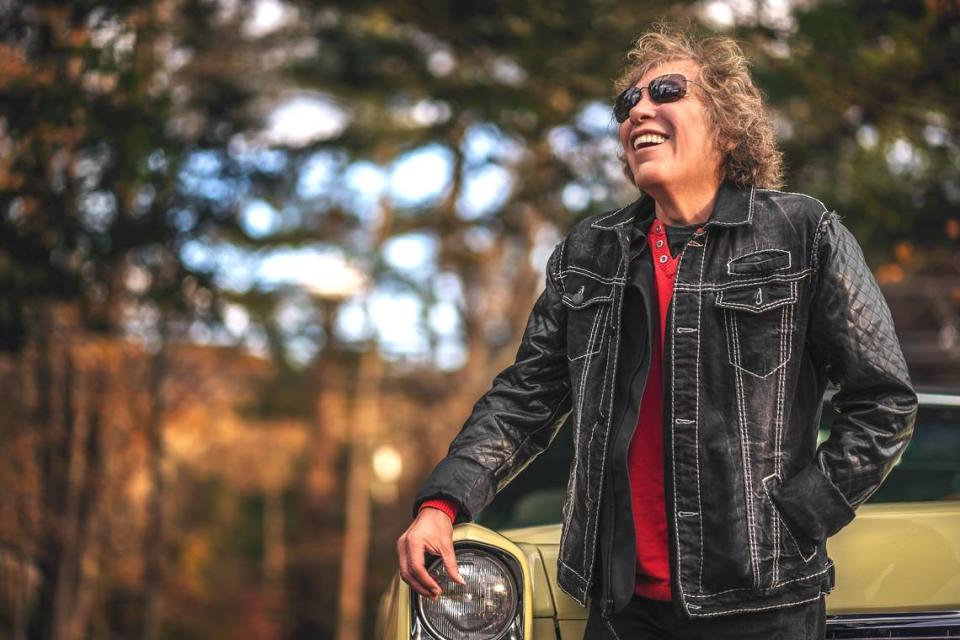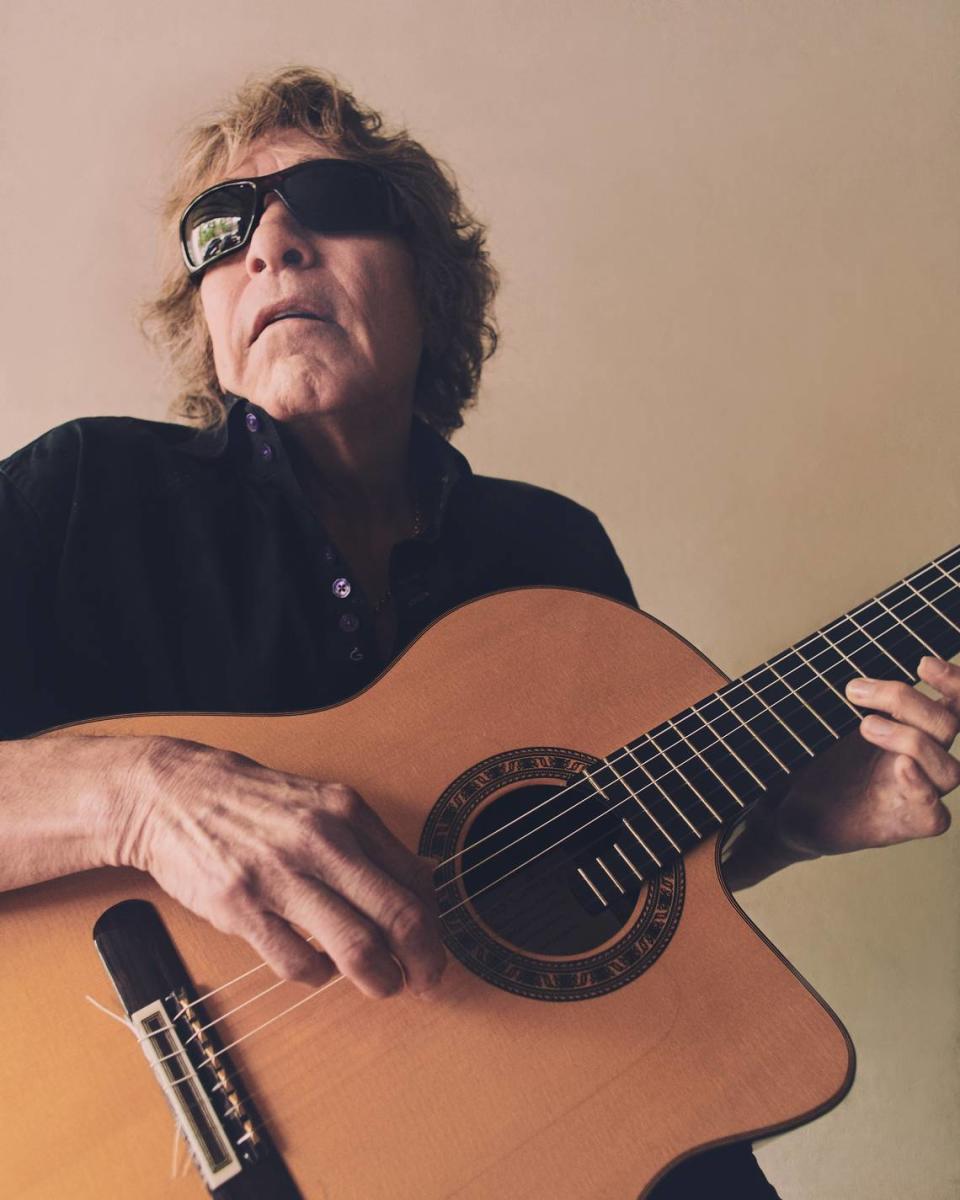José Feliciano on Puerto Rican pride, rock covers, and why women should be everywhere
We’ll have whatever José Feliciano is having.
The veteran Puerto Rican singer-guitarist, famed for covering The Doors’ “Light My Fire” and for his perennial Christmas classic, “Feliz Navidad,” was in Los Angeles on a recent afternoon when he took a break to do a phone interview.
Feliciano, 74, is so instantly engaging you feel you’re catching up with an old friend and not just the voice you remember hearing as a child through tinny speakers on the TV set thanks to his theme song for the old “Chico and the Man” in 1974.

He’s disarmingly chatty and instantly familiar. Feliciano riffs off a reporter’s name with good-natured puns. He opens up about subjects you didn’t even think to ask — like why he left his first wife way back in 1978 to marry his current wife, Susan, whom he met seven years earlier when she was still a teenager.
“She was 16 and I told her she was jail bait and she didn’t know what that was,” Feliciano said. The couple wed in 1982 and have three children together. “I was married to a very good woman but she was a kind of woman that didn’t allow me a lot of freedoms so when I met Susan the whole world changed for me.”
Well, OK.
The musician ‘behind this guitar’
The friendly vibes translate to his latest album, the eight-song “Behind This Guitar,” which reunites him with his other muse — producer Rick Jarrard.
It was Jarrard, after all, who convinced Feliciano to record “Light My Fire” in flamenco style 52 years ago.
The song, and its B-side, a cover of the Mamas & the Papas’ “California Dreaming,” which Quentin Tarantino used prominently in his latest Oscar-winning film, “Once Upon a Time in ... Hollywood,” was the centerpiece of his 1968 album, “Feliciano!”
Feliciano’s “Light My Fire” hit No. 3 on the pop charts just a year after The Doors’ rock version had hit No. 1. The single and album’s success helped Feliciano win the Best New Artist Grammy for 1968. He’s released more than 55 studio albums in English and Spanish around the world ever since.
Jarrard, then a staff producer for RCA producing label mates Jefferson Airplane and Harry Nilsson, also convinced Feliciano to write an original song for their planned Christmas album in 1970. Every season, “Feliz Navidad,” scores as one of the top downloaded holiday singles. Feliciano remakes “Feliz Navidad” as the closing track for his new English-language album, too.
On “Behind This Guitar” Jarrard similarly convinced a skeptical Feliciano to do another rock cover, this time Fleetwood Mac’s “Rumours” centerpiece, “The Chain,” and to boil its original three-part vocal harmonies down to one singular voice.
Feliciano says he always loved the 1977 song and related to its true-life, relationship-gone-bad storyline but wasn’t sure it was a “José song.”
Jarrard also found the Phil O’Donnell/Casey Beathard/Don Simpson title song seven years ago. “Behind This Guitar” seems to tell Feliciano’s life story even though it wasn’t written with the musician in mind. And Jarrard also thought the opening track, “I’m America,” would be perfect for Feliciano.
The three outside songs Jarrard suggested for the album paint a portrait of the artist as definitive as any memoir or documentary.
Jarrard, then, is to Feliciano what producer George Martin was for the Beatles.
“Because, like George Martin, Rick doesn’t discourage anything I do,” Feliciano said. “Rick encouraged me and he’s my brother, not just as a producer but personally. I love him. I think he’s great. He and his wife are good people. He’s a great cook and a great producer.”
A biography in song

The title song “tells José’s life story in 3 1/2 minutes, from his childhood until now. There can’t be a better song for him than this one,” Jarrard said in a statement.
Born blind as a result of congenital glaucoma in Lares, Puerto Rico, Feliciano moved to the Spanish Harlem neighborhood of New York when he was 5.
At 9, a friend of his beloved aunt Blanca Vasquez gave Feliciano his first guitar, a steel-stringed instrument that he said he picked up for $10 from a Jewish pawnshop.
The boy and his instrument proved inseparable. “I say to myself, ‘José, what if you hadn’t done what you did? What if you had been like most kids who are blind that doesn’t do very much?’ I was very lucky.”
Influenced by players like Richie Havens, who would become a friend, Andrés Segovia and Wes Montgomery, Feliciano was also very devoted — behind that guitar. That’s one reason he feels so connected to the song.
“I was a guitar picker, not a strummer like Richie. I went beyond and I went beyond because God gave me the gift to go beyond and to show off and to be an exceedingly good player. I took advantage of it,” said Feliciano.
“I sat on my ass practicing 14 hours a day,” he said. “I’d go to school and come home and the first thing I did was tune into “American Bandstand” with Dick Clark. If could learn a lot of the songs he was playing on his show I thought, in my mind, I was a professional because I could keep up with the songs that he played. And I was into rock and roll from its infancy — singers like Frankie Lymon and Ben E. King were my heroes.”
Puerto Rican pride
“I’m America,” written by Phil O’Donnell and Wade Kirby, is a song about U.S. pride with lines like “I’m the highway, I’m the farm/The fertile fields and boulevards/The hand that rests over your heart.”
But with Feliciano’s lyrical ad-libs — “Don’t you know I’m American/I came here with nothing, that’s all I know/I’m proud to be a Puerto Rican American” — it also enters the national conversation, especially as its Jan. 31 release just preceded Jennifer Lopez’s Super Bowl 54 halftime performance from Miami Gardens in which she wore the Puerto Rican flag as a feathered cape.

JLo, born in New York to Puerto Rican parents, offered a message of solidarity with the U.S. territory and its struggles post-Hurricane Maria. Last year, Feliciano returned to Puerto Rico to perform “En mi viejo San Juan,” a song he had written for “Hamilton” creator Lin-Manuel Miranda’s charity to raise money for the island’s recovery.
In 2020, “I’m America” fits Feliciano as well as any of the hundreds of songs he has recorded and dovetails with his controversial rendition of the national anthem before Game 5 of the 1968 World Series. Many were outraged that that year’s Best New Artist, the musician who made The Doors’ signature song his own, had the audacity to musically refashion “The Star Spangled Banner” in his own Latin American image.
“He was honest. It was not a lack of respect for this country. Nobody loves this country more than him,” Emilio Estefan says in the upcoming “José Feliciano: Behind This Guitar” film documentary that will have its world premiere at the 2020 South by Southwest in Austin on March 18.
In 2018, Feliciano donated the guitar he used to play that national anthem, as well as on “California Dreaming” and “Hi-Heel Sneakers,” to the Smithsonian Museum in Washington.
Feliciano says he isn’t sure whether the message of “I’m America” will change any minds this election year — on either side of the political fence — but he’s hopeful.
“One of the things we have to do as a nation is put an end to anti-Semitism. I’m not anti-Semitic. I’m anti-symmetrical,” he said in a quip.
“I’m very prideful,” added Feliciano. “As I said in the song, my parents and I came with nothing and at the time we were three children and we didn’t know why we came to America but I know I had an aunt who was a seamstress ... and I’ll never be able to repay her for what she’s done for me. Because of her, I went to the Lighthouse for the Blind in New York where I learned to be independent and it is good for me that my aunt Blanca knew what she was doing.”
‘The Chain,’ Feliciano-style
And then there is “The Chain,” the current single from the album in which the twice-married musician takes this classic rock song of divorce — “And if you don’t love me now, you will never love me again” — and personalizes it with flamenco acoustic guitar and the addition of some Spanish lyrics in the coda as well as a more pointedly angry ad-lib: “Damn your lies...Your incessant lies.”
Thematically, Feliciano says he wanted the listener to feel the song’s estranged protagonist’s frustration and the futility of post-relationship anger.
“I made him feel. In relationships that happens. If you can’t have me no one else will. That’s so shallow. If you lose a love you might find another love. It might not be as good as the love you lost but you might find it,” said Feliciano.
Feliciano found a musical GPS by tapping the folk music roots that run through two of the song’s co-writers, guitarist Lindsey Buckingham and singer Stevie Nicks.
“It had the folk music feel from Fleetwood Mac and, of course, I’ve been in love with folk music from Pete Seeger to The Weavers to the Kingston Trio,” he said.
“Rick chose the song,” Feliciano continued. “I didn’t fight him on this one or any of the songs on the album. I wasn’t into doing ‘The Chain’ but if I am doing it I want to do something different with it. So, I put a flamenco style guitar on it because I knew that is something Lindsey didn’t do. I’m a Lindsey Buckingham fan. He’s a great guitarist and I wanted to let him know where I stand as a guitarist. I think it came out very well and am proud of it and happy that I did it.”
Women in senior management
The genial musician on the other end of the phone changes the subject once again. This time, to offer a timely demand for a better future.
To do so, he cites the example of his new boss — Helen Murphy, the CEO of Anthem Records, the label that released “Behind This Guitar.”
“Helen Murphy is what I call a ballsy woman. She has more balls than I do,” Feliciano said. “It’s very tough for women who have these abilities and are not necessarily allowed in [senior management] business. They have to fight to get in. Helen is a fighter and I think men have to start changing their outlook on where women should be. I love women. There’s no place in my mind where they shouldn’t be.”

